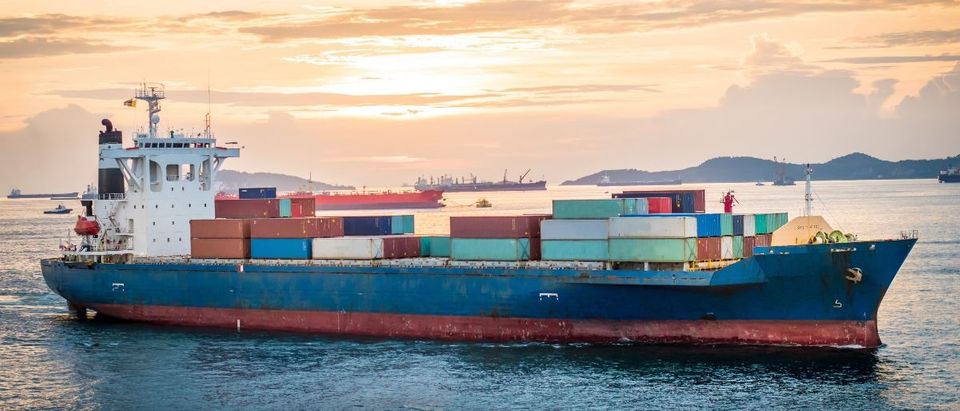Americans should be alarmed by recent calls for repeal of the Jones Act, a 1920 law requiring that merchant vessels navigating between U.S. ports must be manufactured and flagged in the U.S., owned and operated by American companies, and crewed by American citizens. Passed in the wake of World War I to ensure that the United States maintained a vital sea transport capacity in the event of future conflict, the law has been vital to U.S. national security and economic strength for almost 100 years.
Today, the Jones Act strengthens homeland security by reducing the risks of weapons of mass destruction infiltration, terrorism, crime, and illegal immigration associated with inadequately screened foreign crews operating on America’s 25,000 miles of inland waterways and 95,000 miles of shoreline. On the economic front, the statute preserves a shipbuilding and ship repair industrial base that ensures the United States has adequate sealift capabilities under direct national control to support recovery efforts during national emergencies like Hurricane Maria, supports almost 500,000 jobs, and generates nearly $100 billion in output annually.
Critics calling for repeal of the Jones Act advance several unsound arguments that not only fail to acknowledge these substantial national security, disaster recovery, and economic benefits, but also expose the country to grave new threats.
The most potentially catastrophic danger is increasing the threat of attack from weaponized shipping containers. U.S. policy has already recklessly endangered the nation in this regard by allowing Gulftainer, a UAE-based firm with ties to the Russian state-owned exporter of Moscow’s Club-K shipping container cruise missile system, to assume control of a 35-year lease to operate the strategic Port Canaveral, Florida marine terminal without appropriate security review.
Unbelievably, Gulftainer executive Dr. Jafar Dhia Jafar, brother of the firm’s co-owner, is Saddam Hussein’s former top nuclear weapons scientist and worked closely with the Russian government to design a miniature “beach ball” nuclear warhead for the Club-K system. Dr. Jafar has also collaborated with the governments of Iran, North Korea, Iraq, and Syria on weapons of mass destruction proliferation activities and was on the U.S. military’s high-value target list during the Iraq War
The U.S. cannot risk allowing foreign container traffic on its inland waterways after the Port Canaveral debacle, nonetheless at a time when the transportation industry is endeavoring to increase con
A flurry of ill-considered attacks on the Jones Act on disaster recovery and economic grounds have also come from critics of the post-Hurricane Maria relief effort in Puerto Rico who wrongly blame the Jones Act for the difficulties frustrating the island’s recovery. They contend that the Jones Act has reduced the shipping tonnage available to resupply Puerto Rico, slowed delivery of supplies, and increased shipping costs by preventing foreign carriers from calling on Puerto Rican ports. None of these assertions withstand scrutiny.
To the contrary, the Jones Act has ensured reliable, uninterr
Claims that relief from Jones Act requirements would reduce shipping costs are also misguided. It is troubling these arguments never acknowledge that the cost advantages of foreign shipbuilders and carriers stem largely from illegitimate practices such as currency manipulation, government subsidies, and failure to comply with U.S. standards for worker safety, environmental responsibility, and human rights. Assessments by the GAO and New York Fed suggest that these cost advantages would be significantly diminished if foreign carriers had to comply with U.S. standards. These studies also emphasize that there is no reliable, systematic evidence that the Jones Act has increased shipping costs to Puerto Rico, further invalidating the claims of critics to the contrary.
There are many steps that policymakers can take to increase America’s national security and economic competitiveness but repealing the Jones Act is not one of them. At a time when threats to national security continue to grow, both domestically and abroad and America faces increasing economic challenges from countries overseas, America would be unwise to repeal the Jones Act and should continue to support this proven law.
Dr. William J. Murphy is President of Good Government Now, and advocacy group devoted to promoting constitutionalism, the rule of law, and effective public policy. He is an associate professor of social science at the New England Institute of Technology in East Greenwich, RI.
The views and opinions expressed in this commentary are those of the author and do not reflect the official position of The Daily Caller.












